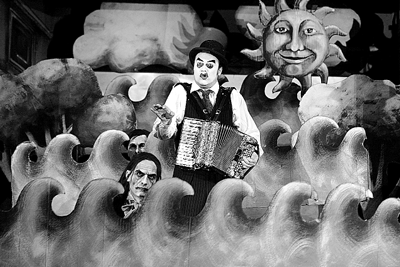The perilous task of scaring hard-bitten New Yorkers just got tougher
The people who vilify the animated characters Sponge Bob for being gay and Buster the bunny for welcoming lesbian moms would be aghast with the new play “Shockheaded Peter,” a bucket of ice water on the beloved notion that our children must be protected from a cruel world.
The show is a satiric, operatic setting of the children’s book of the same name, which like Grimm’s spooky tales, conjures a world where the carefree childhood is shattered. Written by Dr. Heinrich Hoffman in the 19th century as a way of easing children’s fear of medical visits, the story is in the mold of a Victorian etiquette fable, warning of the mishaps that will befall a naughty youngster. Bad table manners, untouched suppers, playing with matches and disobeying one’s parents result in all kinds of gruesome ends. A thumb-sucking child has his thumbs cut off by “the scissor man” and bleeds to death, in one of the most benign of the ten stories.
The performance is a combination of Guignol, puppetry, masque and music-hall performance. The audience for all of this is adult, not juvenile, because what the graphic scenes convey would haunt innocent impressionable minds for weeks to come.
Each story has been set to music, and it is sung and acted out on a creepy human/puppet stage whose forced perspective allows for some interesting visual tricks as the actors are forced to stoop to get through many of the doors. There is a narrator who sets up each scene and takes on several of the more murderous roles. A well-known underground trio from London, The Tiger Lilies, performs the music, a follow-up to their “Taboo” gig. Martyn Jacques, an accordionist and singer, performs in a falsetto accompanied by bass and drums.
It is all very interesting and very avant-garde, but despite a surfeit of cleverness and abundant intelligence, the production fails to coalesce, perhaps due to overkill. By the tenth falsetto song, the words became somewhat unintelligible. The comic bits are extended long past their effectiveness, and the narrator’s commentary is engaging, but over-done, a none too original take-off on Charles Ludlam’s work with “Punch and Judy” for the Ridiculous Theatrical Company in the mid-1970s. Ludlam did more with less, and always knew just how far to push the lunacy.
“Shockheaded Peter,” in contrast, never knows when to stop, and the show would be stronger if the rhythms were more varied and the pieces moved along a bit faster. The timing of pieces and the long holds for effect frequently leave one wondering if this is a musical or an art installation. It seems to want it both ways and ultimately does neither consistently well.
The shock value of challenging childhood’s sacrosanct nature isn’t especially new or groundbreaking. The work here stumbles under its own weight, losing its power to shock or illuminate. As any child will tell you, what is truly terrifying is not violence or mayhem itself but the expectation of it.
The new musical “We’re Still Hot” arrives in New York on a crest of publicity trumpeting the acclaim and sold-out houses that greeted it in Canada. We’ve all been set up, I am afraid, for a disappointment. My enthusiasm for the New York production of this disaster of catastrophic proportions is nil.
Recounting the torturous plot can be avoided. Let’s simply say it involves four women, a 35th high school reunion and—oh yes—menopause, not the first time “the change” has been the subject of a musical. The playwright, lyricist and co-composer is one J.J. McColl, who proudly puts her name above the title, but the problem in presuming to be the Great White Way’s newest triple threat really leaves no fail-safe for the production when something goes hideously wrong. The writing here is so bad that it makes Eve Ensler’s genital narcissism drama of the first order.
The show lacks a single original joke or lyric, but McColl manages to hit all the emotional high points you would expect from a pharmaceutical ad—the lament about hormones, the complaint about glands, the paean to plastic surgery and the discovery of one’s own female power. The characters are strident, superficial and selfish.
Given all that, the cast does a remarkable job of seeming engaged in what they’re doing. Marnee Hollis, Deirdre Kingsbury, Jane Seaman and Deborah Jean Templin do the best the possibly can to make us like these repulsive characters. These actresses deserve better.
gaycitynews.com


































